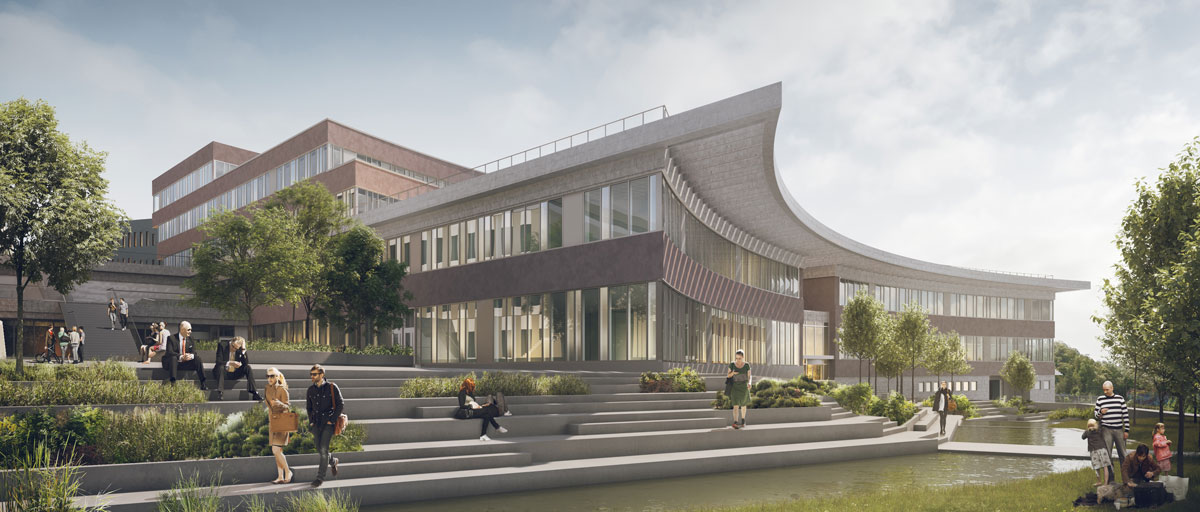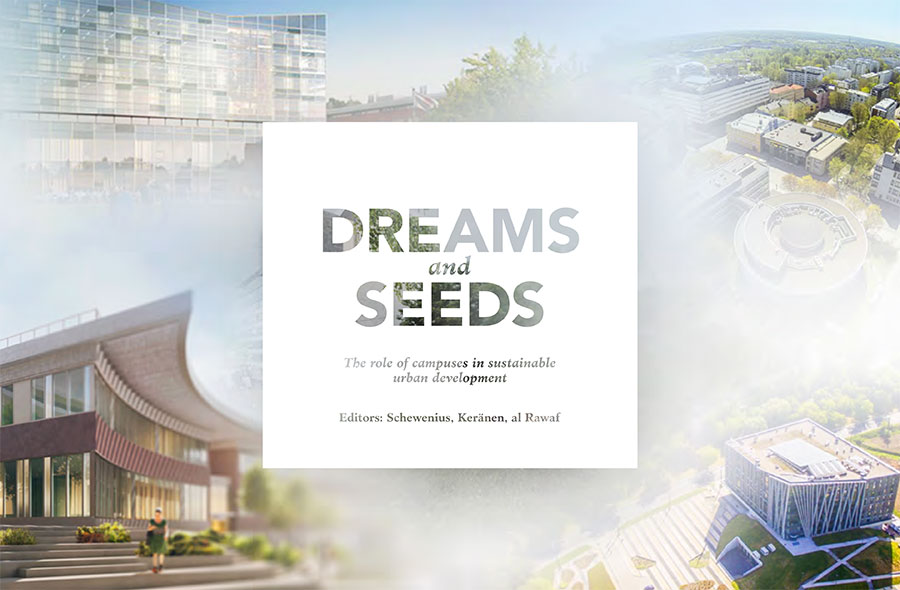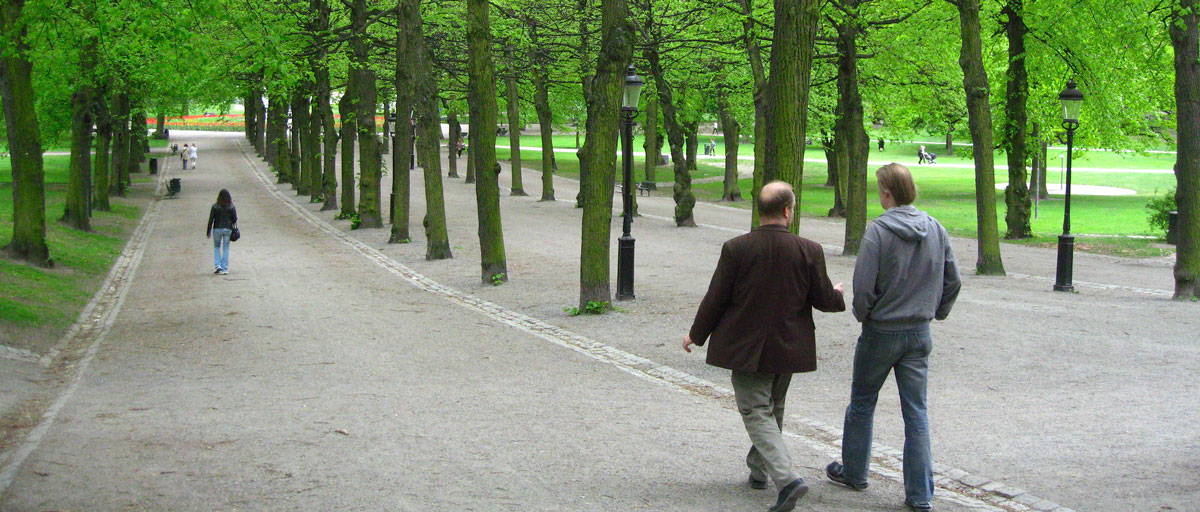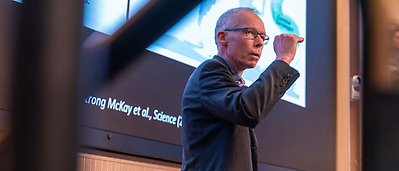
Visions of Stockholm University's new Albano campus, designed based on social-ecological principles. The planning involved students, researchers, civic society groups, real estate owners, town planners and architects. Albano is used as an example how universities and their campus areas can become powerful change agents in the transition towards sustainable development. Photo: BSK Arkitekter
Bildtext får vara max två rader text. Hela texten ska högerjusteras om den bara ska innehålla fotobyline! Photo: B. Christensen/Azote
SUSTAINABLE CAMPUS DEVELOPMENT
No longer old school
Why university campuses play a pivotal role in promoting sustainable development
- A steadily decline in state support for universities has forced them to become more open and entrepreneurial elements of a city and beyond
- Universities are still lagging behind private companies in helping societies become more sustainable
- But universities and campus areas can shield, nurture and empower sustainability innovations strong enough to compete on the free market
The American author and historian Shelby Foote once said “A university is just a group of buildings gathered around a library.” That might be a harsh way to highlight the importance of the library, partiularly as universities today are expected to be much more than just havens for science and social enlightenment.
A steadily decline in state support for universities has led to a shift from public to private funding in a fiercer competitive political environment. That has also forced them to become less disconnected and inward-looking and instead become open and entrepreneurial elements of a city and beyond.
This is also how universities and their campus areas can become powerful change agents in the transition towards sustainable development.
Universities have a moral responsibility to educate future generations about the pivotal role that the natural systems have for sustaining human well-being and societal development
Johan Colding, co-author
The entrepreneurial university
In an article recently published in the journal Sustainability, centre researchers Johan Colding and Stephan Barthel have looked at the potential for making university campuses more integrated in a global sustainability agenda. They believe they come with an untapped potential in reconnecting humans to the biosphere.
“Universities and campus areas can shield, nurture and empower sustainability innovations strong enough to compete even under the tough selection pressure of the free market,” they argue.
This thinking is part of the idea of the “entrepreneurial university”, a term used to explain how public services provided by universities are increasingly exposed and open to demands. This means that in addition to research and teaching, the entrepreneurial university should also contribute to economic development. This does not mean the end of the more classic, introspective universities, but entrepreneurial universities can be well-positioned for higher education that is geared at producing knowledge of practical value for finding solutions to present-day grave problems.
“Entrepreneurial universities are important actors in promoting sustainable development goals since they provide expertise, knowhow and contribute to regional development,” they say. Universities therefore play a role to make these goals possible in education, research, policy formation and information exchange.
Meagre track record so far
Yet despite the potential, the reality is more sober. Universities are still lagging behind private companies in helping societies become more sustainable. Between 1999 and 2011, only 15 out of 14,000 universities had published sustainability reports. Universities engaged in attempts to identify goals and best practices on how to become a sustainable campus, are still focused on limited indicators such as how to become more energy efficient.
"Suffice to say that although universities in theory could act as important transition agents for sustainable development more widely in society, their track record seems meagre," Colding and Barthel say.
To speed up on their ambitions, Colding and Barthel suggest a variety of recommendations for universities to become ambassadors for sustainable development. University campuses often cover large tracts of land, providing excellent starting points for authentic learning about nature and biodiversity. That means campuses can restore an emotional affinity to nature.
Specifically, Colding and Barthel suggest the following recommendations:
- Get students and staff to become stewards of campus open space and natural areas
- Establish sustainability rating systems on how these spaces and areas are managed
- Document effects of efforts to improve the sustainability on the campus
- Turn the campus into a site showcasing examples of sustainability, such organic food production, consumption and climate smart technologies
- Clarify ecological strengths and shortcomings of the campus area and beyond
- In cases where campus land is limited, encourage students (and staff) to become actively involved in managing surrounding natural areas
- Combine all these ideas to increase access to higher education for economically and socially disadvantaged groups
"Universities have a moral responsibility to educate future generations about the pivotal role that the natural systems have for sustaining human well-being and societal development," Coding and Barthel concludes.

The book "Dreams and Seeds: the role of campuses in sustainable urban development" is a compilation of the insights, perspectives and practical examples developed during a two-year joint exploration to find the ingredients and the correct local measurements for sustainable urban campuses. Click on image to read more.
Colding, J., Barthel, S. 2017. The Role of University Campuses in Reconnecting Humans to the Biosphere. Sustainability 9, no. 12: 2349.
Stephan Barthel studies environmental issues in metropolitan landscapes. He uses methods and theories form the natural and the social sciences, as well as from the humanities. He has been part of developing the discourse on urban social-ecological systems over the years.
Johan Colding’s research focuses on ecosystem services in relation to urban planning and design. He is currently involved in the development of the new research frontier known as social-ecological urbanism, where interlinking of urban services and ecosystem services is a key mission, and where institutions (norms and rules) and the city's built form are regarded as key tools to build resilience.

%20HNC_people_park.jpg)






